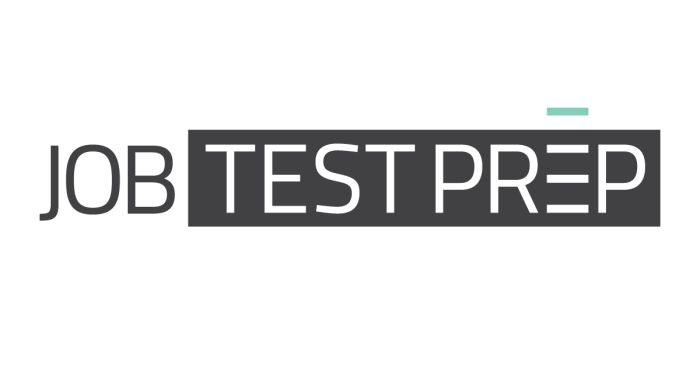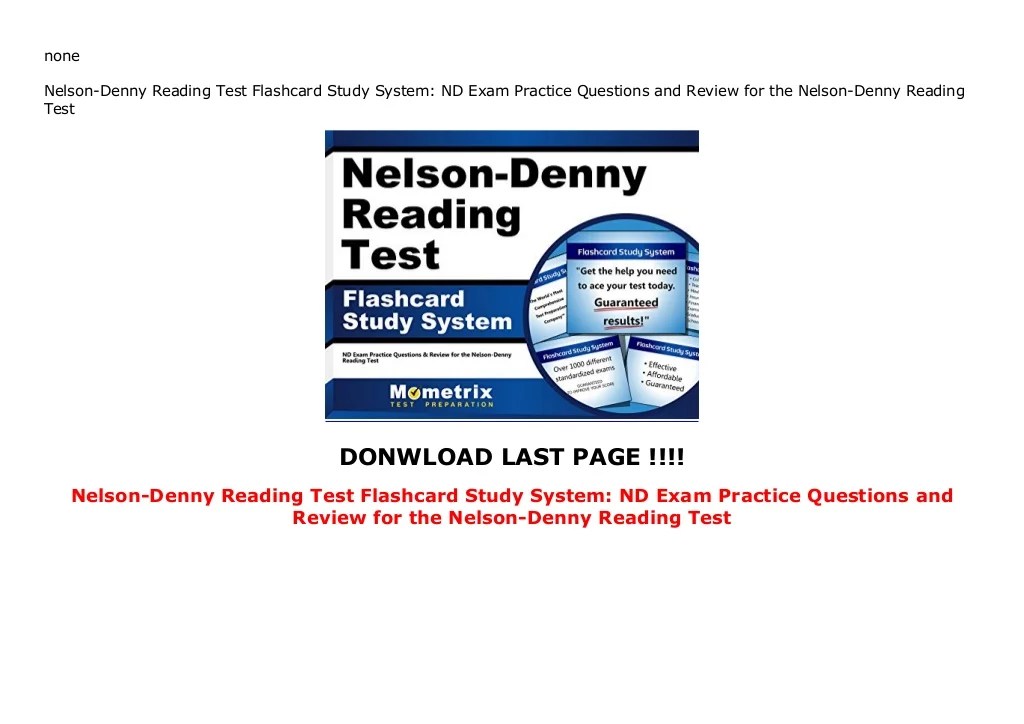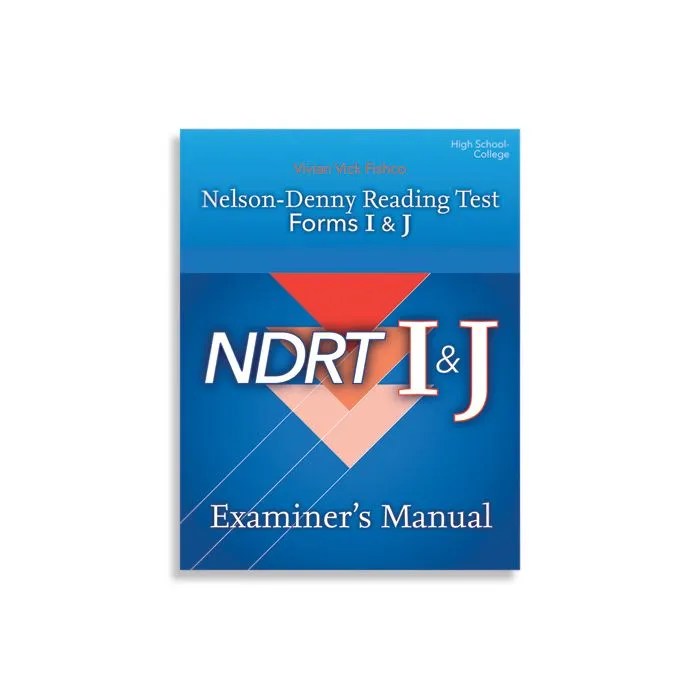As Nelson Denny Test practice questions take center stage, this opening passage beckons readers into a world of knowledge, ensuring a reading experience that is both absorbing and distinctly original.
The Nelson Denny Reading Test is a standardized exam designed to assess reading comprehension and vocabulary skills. By utilizing practice questions, individuals can effectively prepare for the actual test, enhancing their chances of achieving their desired score.
Overview of Nelson Denny Test Practice Questions

The Nelson Denny Reading Test is a standardized test that measures reading comprehension and vocabulary skills. It is often used for college admissions and placement purposes. The test consists of two sections: a vocabulary section and a reading comprehension section.
The vocabulary section contains 50 multiple-choice questions. Each question presents a word and four possible definitions. The test-taker must choose the definition that is most similar in meaning to the word.
The reading comprehension section contains four passages. Each passage is followed by a series of multiple-choice questions. The questions test the test-taker’s ability to understand the main idea of the passage, identify supporting details, and draw inferences.
Practice questions are an excellent way to prepare for the Nelson Denny Reading Test. By practicing, test-takers can become familiar with the format of the test and the types of questions that are asked. This can help them improve their scores on the actual test.
Types of Practice Questions

Practice questions for the Nelson Denny Reading Test come in various types, each designed to assess specific skills and knowledge. Understanding the different types of questions can help you tailor your preparation and improve your performance on the test.
Vocabulary in Context
- Test your ability to understand the meaning of words within the context of a sentence or passage.
- Example: “The candidate’s demeanor during the interview was both confident and assertive.”
Reading Comprehension
- Evaluate your understanding of a written passage, including its main idea, supporting details, and inferences.
- Example: “Read the following passage and answer the questions that follow: The sun is a star that provides light and heat to the Earth and other planets in our solar system.”
Analogies
- Measure your ability to identify relationships between words and concepts.
- Example: “Car is to engine as computer is to ____ (processor)”
Sentence Completion
- Assess your understanding of grammar and sentence structure by filling in missing words or phrases.
- Example: “The students were excited about the upcoming trip, and they couldn’t wait to _____ (travel)”
Strategies for Answering Practice Questions

To enhance your performance on the Nelson Denny Test, it is essential to adopt effective strategies for answering both multiple-choice and open-ended questions. By implementing these strategies, you can increase your accuracy and efficiency, maximizing your overall score.
Multiple-Choice Questions
For multiple-choice questions, consider the following strategies:
- Read the question and answer choices carefully:Identify the key information and understand what the question is asking.
- Eliminate obviously incorrect answers:Rule out choices that are clearly irrelevant or nonsensical.
- Process of elimination:If you are unsure of the correct answer, eliminate choices that you know are incorrect, increasing your chances of selecting the correct one.
- Guess strategically:If you are unable to eliminate any choices, make an educated guess based on the information provided.
Open-Ended Questions
When answering open-ended questions, employ these strategies:
- Understand the question:Determine what the question is asking and what specific information is required.
- Organize your thoughts:Plan your response before writing, ensuring a logical flow of ideas.
- Use specific examples and evidence:Support your arguments with relevant examples and evidence from the text or your own knowledge.
- Be concise and clear:Express your ideas clearly and concisely, avoiding unnecessary details.
Common Pitfalls
Be aware of common pitfalls to avoid when answering practice questions:
- Rushing:Take your time and read the questions carefully before answering.
- Overthinking:Avoid spending excessive time on any one question. If you are unsure, move on and return to it later.
- Guessing randomly:If you are unsure of the correct answer, use the process of elimination or guess strategically.
- Ignoring the text:For open-ended questions, always refer to the provided text for support and evidence.
Sample Practice Questions

The Nelson Denny Test practice questions are designed to provide candidates with a comprehensive overview of the types of questions they can expect on the actual exam. These practice questions cover a wide range of topics, difficulty levels, and time limits, ensuring that candidates are well-prepared for the test.
The following table presents a selection of sample practice questions to provide candidates with a better understanding of the format and content of the Nelson Denny Test:
Practice Question Types
| Question Type | Difficulty Level | Time Limit | Answer Key |
|---|---|---|---|
| Vocabulary | Easy | 30 seconds | Correct answer |
| Reading Comprehension | Medium | 2 minutes | Correct answer |
| Grammar | Hard | 1 minute | Correct answer |
| Math | Easy | 45 seconds | Correct answer |
Practice Resources: Nelson Denny Test Practice Questions
Engaging with practice questions is crucial for refining your skills and boosting your confidence in the actual test. Numerous online resources provide a wealth of practice questions to supplement your preparation.
Creating your own practice questions can also be beneficial. It allows you to focus on specific areas where you need improvement and customize the questions to your learning style.
Regular practice and review are essential for retaining information and enhancing your problem-solving abilities. Consistent engagement with practice questions helps reinforce concepts, improve recall, and build familiarity with the test format.
Online Resources for Practice Questions
- Peterson’s Practice Tests: Offers a comprehensive set of practice questions, including timed and untimed options.
- Kaplan Test Prep: Provides practice questions, diagnostic tests, and personalized study plans.
- Magoosh: Features interactive practice questions with detailed explanations and progress tracking.
- Khan Academy: Offers free practice questions and video lessons covering various academic subjects.
Tips for Creating Your Own Practice Questions, Nelson denny test practice questions
- Identify your strengths and weaknesses through diagnostic tests or practice questions.
- Refer to the official test guidelines to understand the content and format.
- Use textbooks, study guides, and online resources to gather information.
- Create questions that cover a range of difficulty levels and question types.
- Seek feedback from peers, teachers, or tutors to refine your questions.
FAQ
What is the purpose of the Nelson Denny Reading Test?
The Nelson Denny Reading Test evaluates an individual’s reading comprehension and vocabulary skills, providing insights into their ability to understand and interpret written material.
What types of practice questions are available?
Practice questions encompass various formats, including multiple-choice, open-ended, and timed questions, each designed to assess specific reading skills.
How can practice questions enhance test preparation?
Practice questions enable individuals to familiarize themselves with the test format, identify areas of strength and weakness, and develop effective test-taking strategies.